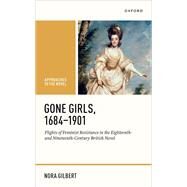Gone Girls, 1684-1901 Flights of Feminist Resistance in the Eighteenth- and Nineteenth-Century British Novel
, by Gilbert, Nora- ISBN: 9780198876540 | 0198876548
- Cover: Hardcover
- Copyright: 10/3/2023
In Gone Girls, 1684-1901, Nora Gilbert argues that the persistent trope of female characters running away from some iteration of 'home' played a far more influential role in the histories of both the rise of the novel and the rise of modern feminism than previous accounts have acknowledged. For as much as the eighteenth- and nineteenth-century British novel may have worked to establish the private, middle-class, domestic sphere as the rightful (and sole) locus of female authority in the ways that prior critics have outlined, it was also continually showing its readers female characters who refused to buy into such an agenda--refusals which resulted, strikingly often, in those characters' physical flights from home.
The steady current of female flight coursing through this body of literature serves as a powerful counterpoint to the ideals of feminine modesty and happy homemaking it was expected officially to endorse, and challenges some of novel studies' most accepted assumptions. Just as the #MeToo movement has used the tool of repeated, aggregated storytelling to take a stand against contemporary rape culture, Gone Girls, 1684-1901 identifies and amplifies a recurrent strand of eighteenth- and nineteenth-century British storytelling that served both to emphasize the prevalence of gendered injustices throughout the period and to narrativize potential ways and means for readers facing such injustices to rebel, resist, and get out.
The steady current of female flight coursing through this body of literature serves as a powerful counterpoint to the ideals of feminine modesty and happy homemaking it was expected officially to endorse, and challenges some of novel studies' most accepted assumptions. Just as the #MeToo movement has used the tool of repeated, aggregated storytelling to take a stand against contemporary rape culture, Gone Girls, 1684-1901 identifies and amplifies a recurrent strand of eighteenth- and nineteenth-century British storytelling that served both to emphasize the prevalence of gendered injustices throughout the period and to narrativize potential ways and means for readers facing such injustices to rebel, resist, and get out.






